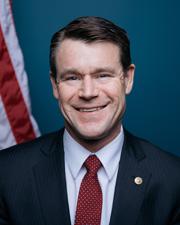Washington, D.C. — In a significant step to strengthen America’s leadership in biotechnology, four Congressional Commissioners from the National Security Commission on Emerging Biotechnology (NSCEB) introduced new bipartisan legislation aimed at streamlining the nation’s biotech strategy and boosting innovation in the face of rising global competition.
Led by Commission Chair Senator Todd Young (R-IN), the group—which includes Senator Alex Padilla (D-CA), Representative Stephanie Bice (R-OK), and Representative Ro Khanna (D-CA)—announced the National Biotechnology Initiative Act of 2025, a bill designed to overhaul how the federal government coordinates and regulates biotechnology.
The legislation follows the release of NSCEB’s final report earlier this week, which outlined urgent recommendations for enhancing U.S. competitiveness in the biotech sector.
“The United States has long been a leader in biotechnology, but we now risk losing our edge to China,” said Sen. Young. “This legislation ensures federal agencies work together efficiently to support American biotech innovation and manufacturing.”
At the heart of the proposal is the creation of a National Biotechnology Coordination Office (NBCO) within the Executive Office of the President. The new office would be tasked with unifying federal efforts, reducing regulatory red tape for proven biotech products, and developing a national biotechnology strategy every five years. It would also be led by a newly established Principal Advisor to the President for Biotechnology, ensuring high-level oversight and integration across federal agencies.
Sen. Padilla emphasized the wide-reaching implications of biotech advancements: “From battlefield technology to agriculture and health care, biotechnology will reshape our economy and national security. Our bill ensures lasting collaboration across government to maintain U.S. leadership.”
The bill also establishes a formal interagency committee and clearly defines roles for all departments involved in biotech policy, aiming to eliminate duplicative processes and bureaucratic delays that can slow progress.
Rep. Bice highlighted the need for regulatory reform: “We must streamline regulation and let private industry lead. America needs to stay ahead of China and ensure our security and economic edge.”
Rep. Khanna framed the initiative as essential for America’s future: “This isn’t just biotech strategy—it’s national security strategy. If we fall behind, we may not be able to catch up.”
The National Security Commission on Emerging Biotechnology, formed to assess the country’s readiness for the rapidly advancing “biorevolution,” released a comprehensive report this week calling for major structural changes in how the U.S. approaches biotech. The bipartisan Commission includes lawmakers and experts from government, industry, and academia.


